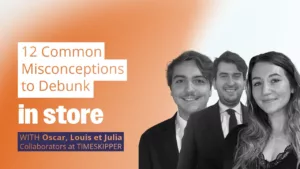In the midst of a generational and social context, where relationships with each other and hierarchical behaviour have significantly changed, the distribution sector is going to have to readjust its management approach. It is not uncommon to find that employees have lost trust in their management and there is often a lack of motivation among staff. Most of the time, this results in disaffection for taking on responsibilities and a lack of interest in managing.
A loss of work values, a lack of faith in authority, management’s failure to assume responsibility … the breakdown in a store’s chain of command is increasingly noticeable. However, the ‘distribution management’ battle is not lost. It is through the notions linked to the art of leadership that we suggest you consider the best way to restore all the manager’s legitimacy in order to take their employees with them on the path of collective improvement.
Distribution Management: why the considerable failure to assume responsibility?
Not saying things clearly and bravely to employees has nearly become customary so as to avoid unrest within the team on the one hand and the involvement of management and employee representatives on the other. At the risk of burying one’s head in the sand, managers were led to believe that it was preferable to remain positive with their employees in the name of a sometimes misinterpreted benevolence. This was an error, and we can easily imagine how not spelling things out – or not saying anything at all – can be a source of misunderstanding and thus conflict and a loss of interest in distribution work.
In recent years, between changes in the sector and the health crisis, things have not become any easier. To meet these challenges, we have expected employees to be more versatile and flexible, training them at maximum speed, without always explaining why. Under the guidance of managers who are often themselves poorly or not trained, or not specifically appointed for their managerial expertise, and whose roles and responsibilities are sometimes still to be clarified. It is also easy to imagine that a certain form of managerial meandering, marked with a loss of meaning, could impact the exercise of authority.
Even if this expression may seem a little outdated, ‘the art of leadership’ in such an environment is meaningful again in the distribution sector: it involves conveying reassuring messages, to support change and gain the teams’ support, while reinforcing the manager’s legitimacy. Values and abilities that need to be brought back into the spotlight and boosted, but not by doing just anything!
What is a ‘leader’ according to the ‘art of leadership’?
Distribution Management: what are the qualities required to manage teams?
A manager who excels in their job is one who has significant authority over their teams, who is recognised and legitimate, and who knows how to implement the brand’s strategy quickly and effectively. A leader as it were, is the real conduit for communications which brings about change, by unifying their teams around a common goal. Although natural authority is an advantage, it is worth noting that it does not concern all managers, and few training courses dare to integrate the ‘art of leadership’ in a practical way.
The parallel drawn with military professions can make the topic sensitive for some players who see a return to “Boss, yes Boss”.
However, this is not the case.
More often than we might think, people management in distribution is comparable with that of the armed forces. There can be a large number of individuals to manage and the relation to time presents similar constraints concerning responsiveness and immediacy with regard to the operational side. Either way, the positioning of the manager at the top of the chain of command and the exercise of their authority in the right way are vital for the smooth running of the group.
We have to admit that employees rely on this authority to focus them, lead them, help them progress, and give them or restore their confidence in management but also themselves. The manager has a duty to know how to recognise the successes and failures of each individual and be able to make fair decisions to develop or discipline them, in order to help them progress. Qualities which require the resolute encouragement of autonomy and accountability, benevolence (the truth), self-confidence and confidence in their ability to manage … which assumes access to the managerial methods and tools that can help their teams grow.
Distribution management: the art of leadership as a virtuous method
The art of leadership relies on a virtuous cycle of know-how and soft skills, the objective of which is to reinforce employees’ autonomy and accountability when they perform their tasks.
For the manager, by considering the rhythm, personality, expertise and talents of each individual, it involves:
- training, i.e. transferring knowledge and know-how and explaining the meaning and importance of each employee’s role;
- organising, i.e. implementing each individual’s know-how into the spirit of the task;
- checking, i.e. verifying that what was requested has been done properly, congratulating in the case of success, ensuring that anything done badly is corrected and sometimes disciplining when necessary.
By training and organising employees and by checking their work, it enables them to gradually master their tasks and reinforces their self-confidence. It is by bringing about change that the manager gains legitimacy with their teams, who will naturally adhere to the rules and then make use of them.
Thus, in the same way as military leaders ensure that their recruits master the practice taught before sending them to the front, (good) managers support their employees in their induction process and help them grow towards autonomy, so that these employees can successfully carry out their tasks. It is in this way that motivation, mutual respect and pride emerge and are maintained.
Beyond their know-how, it is everyday that the ideal manager applies their soft skills:
- Serving their employees and teams by:
– sharing all their knowledge
– listening
– showing an interest in the way in which messages are understood
– demonstrating an ability to explain something as many times as is necessary
– being completely available for the duration necessary.
- Setting an example, i.e. managing know-how and knowing how to assess it, knowing how to delegate and give staff confidence, being present on the ground when necessary to support their teams.
- Being fair, by allocating a fair volume of work to each employee, by showing the same consideration to each individual, while saying what is not working, or congratulating employees collectively and individually.
- Sharing successes and failures.
Finally, the art of leadership concerns all teams, employees, managers and management of the store, which is why the know-how and soft skills described above strengthen staff cohesion, and work for the common good of individuals working at the point of sale. All employees must know the rules according to which their department or store will be organised, with mutual respect and fairness. The fact that the manager practices the art of leadership with their teams ensures unity and therefore the trust that each employee will have in the manager and their environment. Through this action, the manager serves their teams to enable them to achieve the performance level required.
Distribution management: the art of leadership with the TimeSkipper tool
As a SaaS platform for managing teams’ workload in distribution jobs, TimeSkipper facilitates the acquisition of managerial know-how and soft skills.
The solution takes into account what is happening on the ground, the scheduled working hours, specific features of the store and various jobs, as well as the skills of each employee. It automatically and dynamically allocates a workload recalculated according to changes in the activity. This allocation of workload and resources is always optimised to meet the store’s performance requirements, but in a fair way.
Secondly, managers can rely on real figures that have been assessed in order to explain the merits of their decisions, which are therefore understood and legitimised: an indisputable method to ensure trust.
Furthermore, the functions of automatic management provide each individual with a view of their own tasks as well as those of other employees. This principle of transparency gives real meaning to employees’ tasks and legitimises their usefulness as an individual within the team and in the store: the very foundations for commitment and involvement.
As the preferred managerial tool, TimeSkipper facilitates team support and commitment. The solution also legitimises the manager’s position as leader, working for respect, fairness, transparency, autonomy and personal progress.
Finally, stimulating individual and collective confidence and involvement, as well as the manager’s leadership by reviving the exercise of authority … such is the guiding principle of the art of leadership in mass distribution taught by TimeSkipper.






